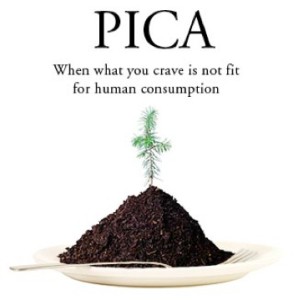Causes of Pica Syndrome During Pregnancy and Its Harmful Effects
If you’ve experienced peculiar cravings during pregnancy, you’re already well aware of how strong these cravings can be. What may seem like a perfectly normal and necessary part of your diet appears strange and sometimes, disgusting to others.
Pica syndrome, a condition that commonly affects children and developmentally disabled adults, can also develop during the course of a woman’s pregnancy. While cravings for things like ice and pickles doesn’t typically carry health risks, pica syndrome drives individuals to ingest nonfood items on a frequent basis.
Understanding how pica syndrome works and the possible harmful effects it can have during pregnancy can help you determine whether some form of treatment help is needed.
Call our toll-free helpline at 888-647-0051 (Who Answers?) if you have questions about pica syndrome treatment options.
Pica Syndrome
Pica syndrome, or pica entails a chronic behavior where craving and eating nonfood substances becomes a regular part of a person’s dietary intake, according to Upstate Medical University. Symptoms of pica include the following:
- Eating non-nutritious, nonfood items for a period of one month or longer
- When eating these types of substances is deemed inappropriate for a person’s cognitive or developmental level
- When eating nonfood substances goes against one’s cultural norms
Causes of Pica Disorder During Pregnancy

Nutritional deficiencies during pregnancy can lead to strange cravings.
While the exact cause of pica syndrome is unknown, a combination of psychological, cultural and biochemical factors likely play a role in most cases. As many affected by pica gravitate towards foods that have certain textures, odors and flavors, biochemical factors may well play a central in forming any one person’s preferences.
Considering pregnancy induces a range of changes in a woman’s body, nutritional deficiencies can be a source of unusual food cravings. There are some research studies that attribute iron deficiency in particular as a cause for pica disorder during pregnancy, especially in cases where a high risk for anemia exists.
Types of Materials Ingested
Overall, the types of materials ingested by people who have pica syndrome fall into three categories:
- Earth-based materials
- Starch-based materials
- Ice
According to Yale University, material types commonly associated with pica include:
- Chalk
- Dirt
- Clay
- Plant leaves
- Starch
- Ashes
- Paper
- Baby powder
- Sand
- Toilet tissue
- Cloth
- Plastic
- Burnt matches
- Balloons
Pregnancy Dangers
During pregnancy, a women’s health status has a tremendous bearing on her body’s ability to nurture, grow and deliver a healthy baby. While nutrient deficiencies may well develop during this time due to the strain pregnancy places on the body, eating nonfood items on a regular basis can impair the body’s systems in any number of ways. When this happens, the risk of having pregnancy and delivery complications increases.
In effect, the materials contained in nonfood substances can impair the body’s digestive processes and prevent needed nutrients from being absorbed from “real” food. Nonfood items like sand, dirt and clay may also contain metal deposits or even lead, which can lead to toxic poisoning over time.
Nonfood materials may also create blockages in the digestive tract and cause cramping, pain or chronic constipation. Also of concern is the likelihood of ingesting bacteria and parasites, both of which can cause harmful infections to develop.
If you or someone you know is pregnant and indulging in pica syndrome-related behaviors, call our helpline at 888-647-0051 (Who Answers?) to ask about available treatment options.






